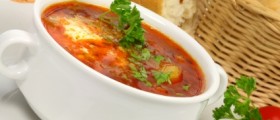
Dyspepsia Symptoms and Causes
Dyspepsia is the indigestion, digestion problem. Possible symptoms of this condition include nausea, vomiting, abdominal pain, fullness after the meal or appetite loss, heartburn and flatulence. Sometimes, patients experience unpleasant smell and taste in the mouth and some tongue coatings. Most of the patients have problems with constipation.
Different mistakes with the food cause dyspepsia. It could be the overeating, eating the wrong kind of the food, or eating food in a hurry that causes indigestion. Some food might decay or be undercooked and they also may be the cause of dyspepsia.
Smoking, alcohol overuse, sleeping problems, not enough exercise, and sometimes extreme emotions, such as anger, fear or jealousy could also cause dyspepsia.
Remedies
Fruits are beneficial to dyspepsia. Lemon is especially good, because it prevents the formation of the acid and maintains a healthy appetite.
Grapes, pineapple and pomegranate juice may also ease the indigestion symptoms. Use it as it is or make some juice out of the fruit.
Try to chew 1g of ginger with some rock salt. It is said to be one of the best solution for chronic dyspepsia.
Garlic and vitamins B are also recommended to be used in indigestionproblems.
Diet for Indigestion
Dyspepsia may be treated with a five-days-fruit diet. Eat three fruit meals a day, combining all kinds of fresh juicy fruits. You might use: melon, peaches, grapefruits, apples, pears, pineapples, grapes or oranges, but avoid all dried, tinned or stewed fruit.
In some severe cases of indigestion, specialists recommend to fast for three days and after that to use the fruits for another 5 days.
After the fruits, you might proceed with some lightly cooked vegetables, buttermilk and juicy fruits for 10 days. Also, you can use yogurt and cottage cheese. Sometimes, the fruit diet should be repeated once or twice a month, depending on a severity of indigestion.
Some food should be avoided whenever possible, because it may provoke the dyspepsia. Avoid: spices, vinegar, pickles, pulses, potato, rice and cheese. All processed food is not good for you, also. Do not use cigarettes, alcohol, tea or coffee.
Prevention
Sometimes, just eating right food the right way helps. Try to avoid eating and drinking at the same time. Eat slowly and try not to overload the stomach. Don’t eat if you don’t feel hungry, or if you feel worried, it may affect your digestion. Don’t mix too many things on your plate, and do not mix and eat raw vegetables and raw fruits together. They need different enzymes to be processed and this might upset your stomach.
Drink enough fluid and use at least 6 glasses of water every day. Cold hipbath, wet abdomen pack and yoga practice might be beneficial in the long run to fight the indigestion.

















Your thoughts on this
Loading...